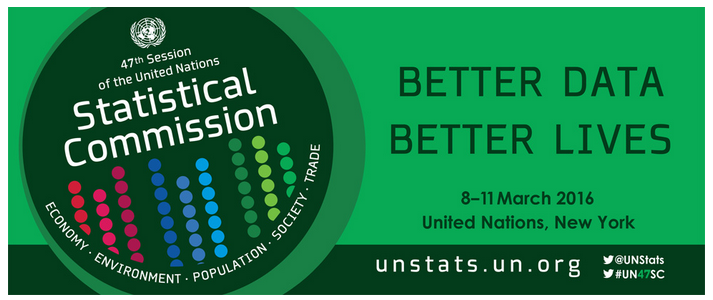 10 March 2016: As part of the UN Statistical Commission’s (UNSC) 47th session, governments discussed climate change statistics and related issues, including their relation to the Sustainable Development Goals (SDGs), in particular Goal 13 (Take urgent action to combat climate change and its impacts).
10 March 2016: As part of the UN Statistical Commission’s (UNSC) 47th session, governments discussed climate change statistics and related issues, including their relation to the Sustainable Development Goals (SDGs), in particular Goal 13 (Take urgent action to combat climate change and its impacts).
UNSC 47 is taking place from 8-11 March 2016, in New York, US. Delegates urged the international statistical community to expand capacity efforts on climate change statistics, at the national, regional and global levels, in line with the SDGs and the Paris Agreement on climate change.
They also: encouraged national statistical systems to invest in the development of climate change statistics; urged the donor communities to mobilize additional and substantial resources to enable environment and climate change statistics in developing countries; requested the UN Statistics Division to review the work of the UN Economic Commission for Europe (UNECE) on climate change statistics and indicators, and consider it as a base for developing a global climate change indicator framework applicable to countries in their different stages of development; highlighted that the indicators for the Sendai Framework for Disaster Risk Reduction (DRR) 2015-2030 need to be considered in developing the global indicator framework for the SDGs; and requested Statistics Division to develop a work plan on climate change indicators, to be submitted for UNSC’s consideration at its 48th session, in 2017.
Italy highlighted that the contribution of all actors to capacity building is important. The EU recommended using existing indicator frameworks when designing the climate change indicators. Suriname stressed the need for more emphasis on training at regional and sub-regional levels. Canada, supported by Mongolia, called for taking into consideration the limitations of the proposed SDG 13 indicators when creating the global climate change indicators. Viet Nam stressed the need to look at the human cost of environmental disasters when assessing climate change.
El Salvador called for including: reference to the principle of common but differentiated responsibilities (CBDR) in the document; an appropriate reference to migration; and a clear distinction between refugees and migrants. He said official statistics should be the only source of information on climate change.
Morocco, for the African Group, highlighted the need for a standardized and comprehensive approach that enables the national statistical offices (NSOs) to decide based on the particular circumstances of countries. UNECE called for NSOs to work with climate institutions and international institutions. [UNSC 47 Website] [Climate Change Statistics: Report of the Secretary-General] [IISD RS Coverage of UNSC 47] [IISD RS Twitter Feed]